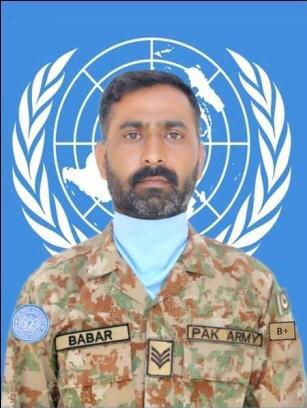ISLAMABAD: A Pakistani soldier serving as a UN peacekeeper in the Democratic Republic of Congo was killed in a militant attack in the country’s volatile east, the military said.
A group of six militants reached the United Nations’ permanent operation base in the district of Minembwe, ostensibly to surrender their weapons as part of a UN initiative. But the group’s leader started firing indiscriminately, Pakistan’s military said in a statement late Saturday.
A Pakistani soldier serving as a guard at the weapons surrender point was shot in the head, the statement said. Pakistani peacekeepers responded to the fire immediately, it said, without offering details.
The badly wounded soldier, identified only as 35-year-old Babar, was rushed to the nearest Pakistani army medical unit but he later died.

This photo shows Pakistani soldier Babar, who lost his life in the Democratic Republic of Congo. (Photo courtesy: ISPR)
The UN identified the gunmen in Friday’s attack as suspected Twirwaneho combatants. The Pakistani military said they were linked to the Banyamulenge, a Tutsi community in the eastern province of South Kivu.
Pakistan is part of a UN peacekeeping force of more than 16,000 troops and police called the United Nations Organization Stabilization Mission in The Democratic Republic of Congo (MONUSCO). It began in July 2010 and is aimed at protecting civilians, deterring armed groups and helping build state institutions and services.












